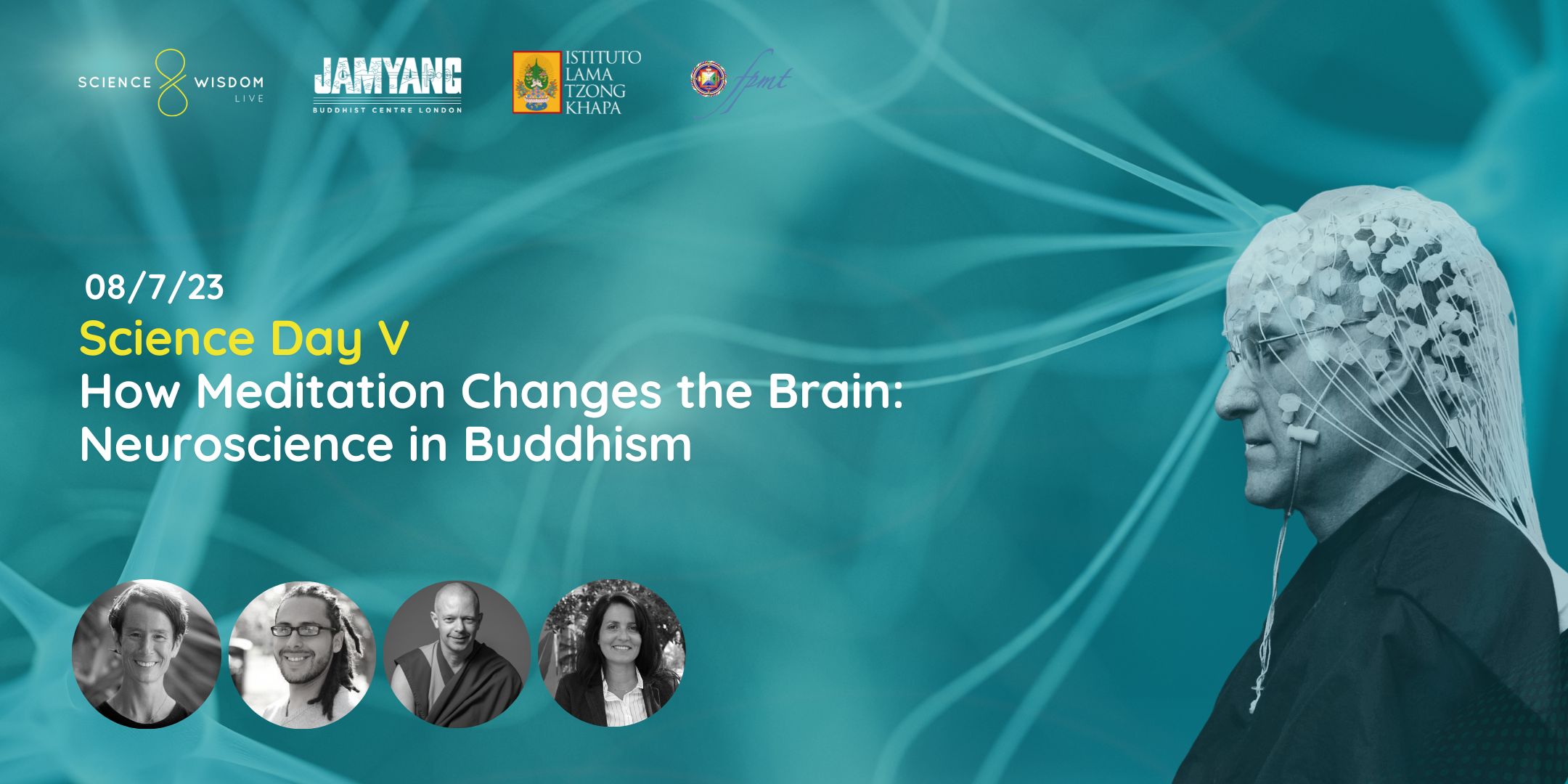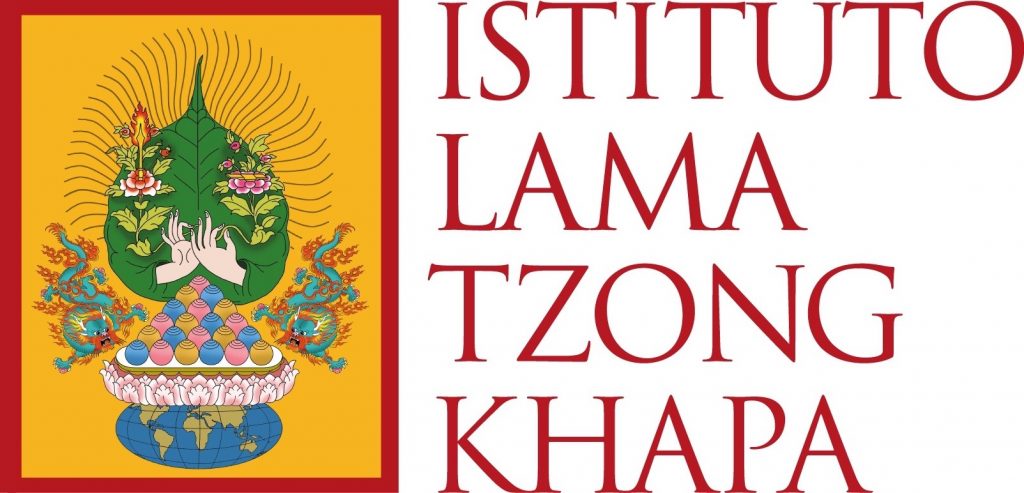How Meditation Changes the Brain: Neuroscience in Buddhism
A collaboration between Jamyang London Buddhist Centre, Science & Wisdom LIVE and Instituto Lama Tsong Khapa.
- 8th July 23
- 4:00pm (BST)
- Vanessa Zuisei Goddard, Dr. Juan Santoyo, Dr. Ekaterina Denkova, Geshe Tenzin Namdak, Matthew McArthur & Scott Snibbe
- Online
Programme
Please note: all sessions are shown in London BST time
Other times can be found using Time Zone Converter
16:00-16:40: Vanessa Zuisei Goddard – Talk & Guided Meditation (title tbc)
16:40-17:20: Dr. Juan Santoyo – Talk (title tbc)
17:20-18:00: Joint Q&A with Zuisei Goddard and Dr. Santoyo
Session moderated by Matt McArthur.
We will take a short break from 18:00-19:00
19:00-19:40: Dr. Ekaterina Denkova – Talk
19:40-20:20: Geshe Tenzin Namdak – Positive Transformation in Buddhist Mind Science
20:20-21:00: Joint Q&A with Dr. Ekaterina Denkova and Geshe Namdak
Themes we will explore
The impact of stress on the brain’s ability to grow and learn
Mind-training techniques to promote health, resilience, and well-being
Attitudes and emotions affecting the development of our brains and minds
Using contemplative practices and science to foster collective healing, equality, and justice
Reconnecting with nature and exploring indigenous practices
New developments in neuroscience and its applications to Buddhist practices
About Science Day V
Scientific research on meditation has often focused on mindfulness-based interventions, but there are many other techniques to support the cultivation of meaning and happiness in our lives. In this event, we will move beyond mindfulness and explore how applying contemplative practices in the field of neuroscience can increase our resilience, growth, harmony, well-being and neuroplasticity.
Neuroplasticity is the adaptive process whereby the brain re-wires itself in response to thoughts, behaviours and experiences. Due to this phenomenon, destructive emotions and negative experiences—like trauma, bias and addiction—can become deeply embedded in our neural circuits, adversely affecting our well-being and daily life. The negative emotions and stress that we hold onto can stunt the growth of our brains, impacting our ability to learn and evolve.
Fortunately, the opposite is also true; positive thoughts and habits can transform our minds, and lives, for the better. But how do you begin addressing these deep-rooted traumas and negative emotions? How do you fundamentally shift your perspective to one that benefits not only you but society as a whole?
This is where meditation and mind-training techniques come in. There are many practices and tools—beyond mindfulness—that we can use to break free of old patterns, create virtuous new habits, and increase neuroplasticity. By leveraging scientific research and contemplative practices, we can promote collective healing, equality and justice in our world, as well as improve our own health, resilience and wellness.
How Meditation Changes the Brain: Neuroscience in Buddhism: is led by the esteemed Buddhist scholars Geshe Tenzin Namdak and Vanessa Zuisei Goddard and distinguished contemplative neuroscientists Dr. Juan Santoyo and Dr. Ekaterina Denkova. These teachers will guide you through the various ways that meditation influences the brain, enhances our focus, allows us to release ingrained patterns and promotes collective well-being. We look forward to sharing this powerful learning experience with you.
Speakers
Session 1
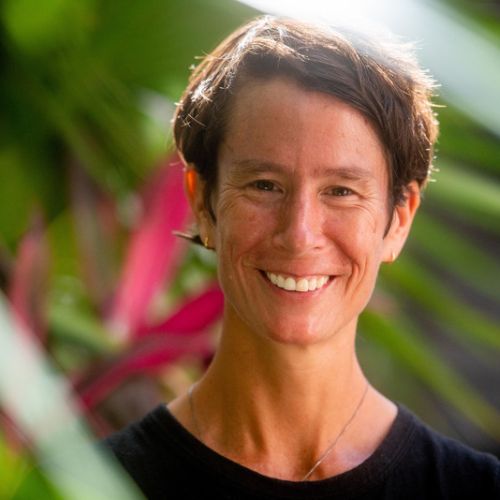
Vanessa Zuisei Goddard
“What we think is what we see and who we become. That’s why it’s so important to know our thoughts and nurture those that help and not harm.”
Vanessa Zuisei Goddard is a writer, editor, and Zen teacher based in Playa del Cármen, México. She lived and trained full- time at Zen Mountain Monastery in Upstate New York for almost twenty-five years—fourteen of those years as a monastic. She’s now the guiding teacher of the Ocean Mind Sangha, and works virtually with new and experienced Buddhist practitioners, especially those whose life circumstances preclude them from engaging more formal Zen training.
Zuisei is the author of Still Running: The Art of Meditation in Motion, and the upcoming children’s book Weather Any Storm. Her articles have appeared in Tricycle, Lion’s Roar, Buddhadharma, and Parabola. Currently, she’s also Tricycle Magazine’s Teachings Editor. She can be found at www.vanessazuiseigoddard.org.
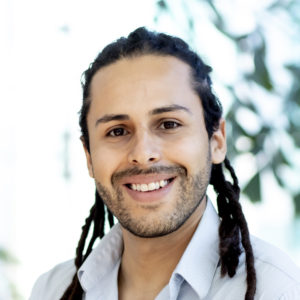
Juan Santoyo
Juan Santoyo is an early-career researcher from Colombia who works in neuroscience and contemplative research. His training has involved studying the neurophysiological dynamics underlying meditation training and sensory perception in humans, and the structure and dynamics of sensory systems in mice. Juan has worked on the development of strategies for neurophenomenological research as well as genetic techniques for mapping and manipulating neural circuits in mice.
As a PhD student in MIT’s Department of Brain and Cognitive Sciences, Juan is studying how genetics and environmental adversity like stress, violence, and resource inequity combine to impact the brain and contribute to psychiatric and neurodegenerative diseases.
Outside of his research, Juan co-founded The Black Lotus Collective, an organization aimed at grounding the work of challenging systems of oppression in contemplative practice, as well as creating contemplative communities where people with marginalized identities feel safe, seen, and celebrated. Bringing these different threads of work together, he has been working in Medellín, Colombia to develop, implement, and test a meditation-based program to help FARC-EP ex-combatants with the psychological experience of reintegration as part of Colombia’s ongoing peace-building process.
Session 2
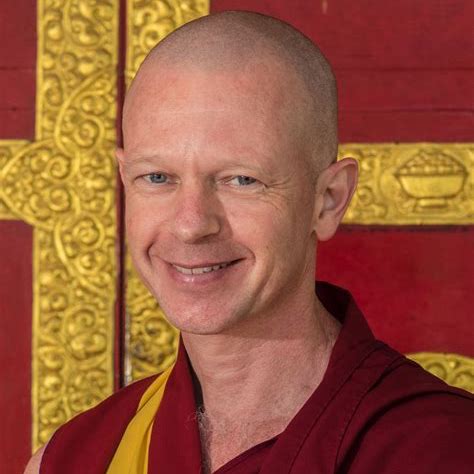
Geshe Tenzin Namdak
Geshe Tenzin Namdak first worked as an environmental researcher having graduated in hydrology from Van Hall Larenstein University, The Netherlands. He started studying Buddhism at Maitreya Institute in 1993 and took ordination from His Holiness the Dalai Lama before engaging in his formal studies in Buddhist philosophy and psychology at Sera Jey Monastic University, South India, in 1997. He completed the entire twenty-year Geshe program at Sera Jey in 2017 and the traditional one year Vajrayana study program at Gyume Tantric College in January 2019, the first Westerner to do so. Because of his deep interest and background in science and as a member of Sera Jey’s Education Department he spoke on and organized various dialogues and conferences on contemporary science and ancient contemplative wisdom of the mind and its philosophy.
Currently, he is the resident teacher at Jamyang Buddhist Centre, London, and teaches worldwide.
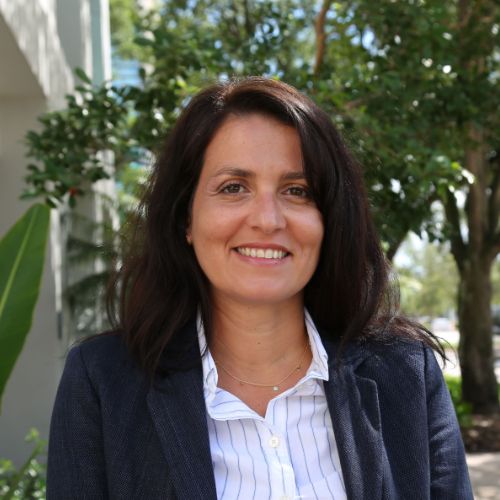
Ekaterina Denkova
Dr. Ekaterina Denkova is a Research Assistant Professor in the Division of Cognitive & Behavioral Neuroscience in the Department of Psychology at the University of Miami. She serves as the Assistant Director of the Neuroimaging Facility & Assistant Director of Research for the UMindfulness Initiative. She received her Ph.D. from the University of Strasbourg after which she joined the University of Alberta as a CIHR Fellow. She serves as Co-investigator on several federally funded grants with Dr. Amishi Jha.
Dr. Denkova expertise is in cognitive and affective neuroscience. Using brain and behavioral methods, she studies the neural basis of cognitive and affective processes and their trainability with mindfulness training. Her program of research focuses on: 1) The interplay between cognitive and affective processes underlying personal memories and thoughts, such as mind-wandering, ruminations, and intrusions; 2) The impact of mindfulness training on these cognitive and affective processes in high-stress/high-demand professionals. She can be found on her lab’s website.
Talk Outlines
Vanessa Zuisei Goddard
There’s growing evidence of the physical, psychological, and even neurological long-term benefits of meditation, and one simple way to understand these benefits is in terms of what in Buddhism is called “mind training.” Moment to moment, we train ourselves to see our thoughts and our emotions clearly, so we can make skillful choices about how to act. Over time, the long-term effect of those choices becomes self-nurturing, creating new pathways of behavior that positively affect our experience of ourselves and the world. For example, if we imagine the mind as a garden, ourselves as gardeners, and the choices we make for our actions as seeds, we’ll quickly see that “watering” seeds of anger or discontent in our minds causes more anger and discontent to “bloom,” while nurturing seeds of kindness or mindfulness has a corresponding result. In other words, what we think is what we do, is who we are. In this talk we’ll explore the ways in which contemplative practices can offer a clear and direct understanding of who we are and how to better act to foster actions that help and not harm—actions that can bring about our individual and collective liberation. The talk will conclude with 10 minutes of guided meditation practice.
Dr Juan Santoyo
In the first few decades of research on how meditation changes the brain, one of the most important fruits of this work has actually come from the reversal of this question– how can meditation change the brain sciences? An ethical encounter between different bodies of knowledge and ways of knowing requires humility and openness and the encounter between science and Buddhism, particularly in the context of meditation research, has brought these fundamental issues to the forefront. This talk brings together research and personal experience to discuss how meditation is changing the brain sciences and how this changes the way we can engage with the question of how meditation changes the brain. By incorporating decolonial research frameworks, this talk seeks to explore pathways for fostering continued dialogue and collaboration between Buddhism and science, while also considering their intersection with indigenous contemplative traditions in the Americas. The potential fruits of this weaving together is explored through examples of how western science and contemplative methodologies might collaboratively contribute to the science of stress and aging.
Geshe Tenzin Namdak - Positive Transformation in Buddhist Mind Science
How do we perceive the world and how does our mind shape those perceptions into an understanding of what we perceive? Buddhist Mind Science explains these essential aspects of consciousness and their emotions. It also helps us to eliminate distorted perceptions and destructive emotions and shows us how to develop constructive forms of thinking, become more emotional intelligent and generate more sustainable happiness. Exploring these ideas helps us to see the infinite potential of consciousness and generates a deep conviction in the possibility of radical positive transformation.
Event Organiser
A collaboration between Jamyang London Buddhist Centre and Science & Wisdom LIVE.
In partnership with Istituto Lama Tzong Khapa.

